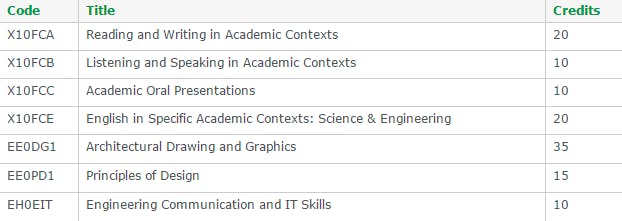BEng Architecture
Introduction to the Program
The Bachelor’s in Architecture at The University of Nottingham Ningbo China (UNNC) is a three or four year undergraduate degree program taught in English.
About UNNC
The University of Nottingham Ningbo China (UNNC) was the first Sino-foreign university to open its doors in China. Established in 2004, with the full approval of the Chinese Ministry of Education, we are run by The University of Nottingham with cooperation from Zhejiang Wanli Education Group, a key player in the education sector in China.
The University of Nottingham is in the top one percent of more than 7,500 higher education institutions worldwide and league tables consistently rank the University highly. For more info visit the page here.
About the Program
This course introduces design skills and technologies, combining humanities and sciences that influence the built environment, allowing you to acquire the necessary skills for architectural design and a wide range of careers. A study of historical precedent and environmental design are central to the design component of the course.
In this programme, you will learn how to design a small building within the wider context of human settlements and environmental concerns. Later, as you deepen your knowledge, you will be given the opportunity to work on more complex design projects.
By the time you graduate you will have:
- developed problem-solving skills in aesthetics, planning, building construction and building performance
- a broad grounding in design thinking
- an ability to analyse environmental issues
- vocational skills
- a thorough grasp of green building concepts and technical details
Curriculum
In your first, or preliminary, year you will concentrate on developing your English proficiency to a high level. Students who can demonstrate a high level of competence in academic English can skip the first year to enter the degree programme proper, from year two.
In your second year, you will undertake design projects with limited objectives, proceeding by stages to the design of a small building. In your third year, you learn how to design within the wider context of human settlements and environmental concerns. In your final year, you will have the opportunity to demonstrate your knowledge and flair through complex design projects. By the time you graduate, you will have developed problem-solving skills in aesthetics, planning, building construction and building performance.
The curriculum of this course is the same as the BArch Architecture offered at The University of Nottingham in the UK. As the Architects Registration Board in the UK does not accredit architecture courses taught outside the UK, the course in Ningbo carries a different title.
Course Structure
All years are delivered in China at the university of Nottingham Ningbo.
Year One (Preliminary year – Ningbo) N.B. This year is not compulsory for students with appropriate qualifications for year two entry.
Students must take all modules in this group.

Total Credit: 120
Year Two ( Qualifying Year-Ningbo)
Typical modules of this year include:
- Architectural Design Studio 1A
- Environmental Science for Architects 1
- Tectonics 1
- Architectural Humanities I: History of Architectural Meaning from Antiquity to the Present Day
- Integrated Design in Architecture
- Architectural Design Studio 1B
Year Three (Part I-Ningbo)
Typical modules of this year include:
- Integrated Design in Architecture 2A
- Architectural Design Studio 2A
- Environmental Science for Architects 2
- Tectonics 2A
- Tectonics 2B
- Architectural Humanities II
- Architectural Design Studio 2B
- Integrated Design in Architecture 2B
Year Four (Part II-Ningbo)
Typical modules of this year include:
- Architectural Humanities III: Critical Theory and Advanced Interpretation
- Integrated Design in Architecture 3
- Architectural Design Studio 3
- Practice and Management
Entry Requirements
Minimum English Requirement
In addition to academic requirements, students whose first language is not English or entry qualification was not obtained in the English medium are required to provide evidence of their proficiency in English.
To ensure that you can fully benefit from your studies at UNNC, you will need to demonstrate a required level of English language proficiency.
For Preliminary year (year one) entry
- IELTS 5.5 with the writing band no less than 5.0 or
- PTE Academic 55 (minimum 51)
For Qualifying year (year two) entry
- IELTS 6.5 with the writing band no less than 6.0 or
- PTE Academic 62 (minimum 55)
Students who have completed a recognised degree, or completed the whole of their secondary education in one of these countries within the last 10 years are not normally required to take a separate English language test.
Otherwise, in addition to the more common language qualifications – such as IELTS, TOEFL, (I)GCSE, O level, IB and A and AS level English – the University also considers a number of other English language qualifications for admission.
The minimum English language requirement for BA English Language and Applied Linguistics, BA English Language and Literature, and BA English with International Business is:
- IELTS 7.0 with each band no less than 6.0 or
- PTE Academic 67 (minimum 55)
Start Date of the program
September
Application Deadline
31 May
Tuition Fees
The tuition fees are RMB80000 per year. The total for the 4 year program is 320000 RMB.
Accommodation
The University has several buildings designated for international students, building 11, 18 and 20. All rooms are fully furnished and equipped with air conditioning and a telephone and computer point; enabling students to make and receive telephone calls and access the University’s data network from their bedrooms. For further information on the accommodation visit the accommodation page here.




